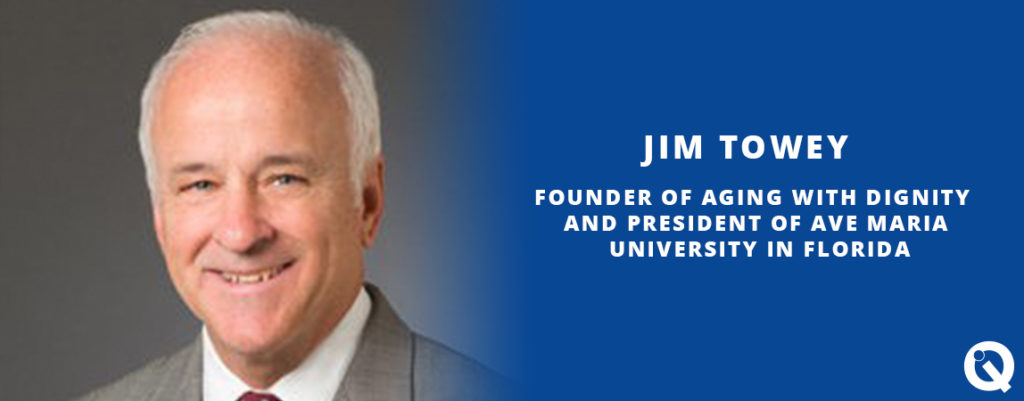Jim Towey, Founder of Aging With Dignity and President of Ave Maria University in Florida, will deliver the keynote address at the Conversation of Your Life (COYL) Quality Breakfast on June 13 (open to Quality Institute and COYL Task Force members only, including Mayors participating in COYL). Towey also is co-author of the Five Wishes document and served as Mother Teresa’s legal counsel for 12 years.
Can you explain what motivated you to create the Five Wishes document, which is a living will and health care power of attorney?
I was introduced to end-of-life care in Calcutta, India, in Mother Teresa’s Home for the Dying. And when I went there, I was really struck that in this very broken city there was so much dignity and beauty in her home. And so that really startled me, because I, like most people from United States, did not expect that care in Calcutta was superior in any way to what we do here, where so often we isolate people who are dying. I met Mother Teresa and saw that people were loved and their dignity was affirmed. I eventually wrote Five Wishes.
How is Five Wishes distinct from other advance directives?
I also lived in a home for people with AIDS for a year and worked there for three and a half years. And I saw what people truly wanted at the end of life. But the typical advance care directive was all medicalese, legalese … basically unusable. The people I met wanted to talk about more than just their medical care. They wanted to talk about their dignity, their comfort, and how they wanted to be remembered. I talked to a lot of people and put Five Wishes in simple English and made it easy to use and to help families assert their rights. I think that’s why Five Wishes has caught on and tens of millions are in use now.
Can you tell us how you see the Quality Institute’s Conversation of Your Life changing the culture around death in New Jersey?
I think the Conversation of Your Life initiative has been transformative and I only wish it was going on in all parts of the country. It is helping people talk about a subject that’s very difficult to talk about yet is extremely important. If the conversation is just about feeding tubes and ventilators then no one wants to have that conversation. But if it’s about your life and its meaning, and how you want to be cared for, how you want to be remembered, then you can get into all aspects of how you want to be treated in times of serious illness: medically, spiritually, and emotionally. COYL makes it person-centered and affirms human dignity.
Is COYL unique or are there other initiatives like this that you’ve seen?
We’ve worked with other community initiatives, but COYL stands out because of its statewide focus, which is a smart strategy. I think COYL is unique because so many communities are in denial about this. So often the elderly and disabled are exiled to the margins of society. Nobody wants to talk about dying. And when you have whole communities in denial you have bad outcomes. Families play a guessing game of what the patient wants. There’s a lot of guilt and a lot of blaming. We can do better than this. This initiative helps children be there when their parents need them most.
What are the main takeaways that you want people to leave the Quality Breakfast with?
To keep the focus on the human dignity of those being treated in times of serious illness. To keep the focus on their rights to have their wishes respected and followed even if you may personally disagree with them. For individuals, I want them to leave with a sense that they have peace of mind that they are going to commit their wishes in writing but also they’ll have conversations so that everyone’s on the same page in the family. For CEOs, providers, insurers — that they would leave inspired to rediscover why they got into healthcare, and hopefully rediscover how they can make this experience easier for patients. That’s a win for hospitals, insurance companies — for everyone.

